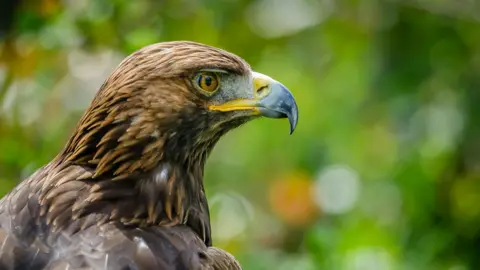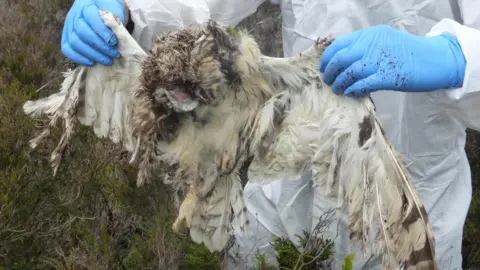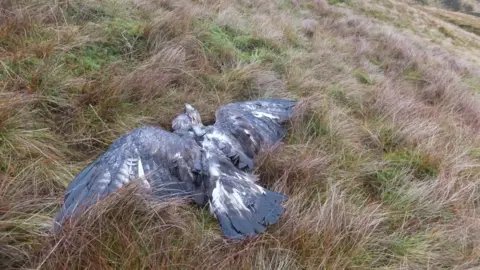Rogue gamekeepers killing birds of prey, says RSPB

 Getty Images
Getty Images
More than 1,300 protected birds of prey – from hen harriers to golden eagles – have been killed across the UK over the past 15 years, according to the RSPB.
It described the deaths as a “national disgrace” and blamed the majority of incidents on rogue gamekeepers trying to protect stocks of pheasant, partridge and grouse on countryside shooting estates.
One rare witness to an illegal shooting in the Peak District told the BBC he was disgusted and that the killings were “wrong on every level”.
The British Association for Shooting and Conservation (Basc) said its members had “absolutely zero tolerance” of the illegal shooting of birds of prey.

 RSPB
RSPB
The RSPB said the number of killings recorded was likely just the tip of the iceberg as they often happened in remote parts of the countryside and were therefore hard to detect.
One birdwatcher, who spotted a short-eared owl above moorland in the Peak District only to see it shot out of the sky, agreed to speak to the BBC anonymously as he feared reprisals for reporting the killing to the police.
He said the killing was “wrong on every level”, explaining: “This was an owl which was doing no wrong, a beautiful bird people go out of their way to watch, and someone had thought ‘I can shoot that!’.”
“Whilst I was watching, it effectively went puff and it disappeared. I instantly knew what had happened. At that point I was in utter, well shock wasn’t the word, but I was just disgusted by what I had seen. Then it occurred to me there was a guy on the moor.
“The one thing that came to my mind is that the guy who shot the owl would have shot any bird of prey that came towards him at that point. He made no distinction. It came, bang, it was gone.”
The witness reported the shooting to the police and helped them to locate the body of the owl. No-one was prosecuted over the incident which took place two years ago.

 RSPB
RSPB
The RSPB said that, of those that have been prosecuted for killing birds of prey over the past 15 years, three quarters had links to shooting estates or were gamekeepers.
The organisation said that was because gamekeepers are trying to protect their grouse, pheasants and partridge – and the profits they bring.
The shooting industry says it is worth around £3.3bn to the UK economy every year.
Its supporters insist estate owners and their land managers do much to protect the countryside and its wildlife.
Gareth Dockerty, from Basc, told the BBC: “We have absolutely zero tolerance for any form of illegal killing of birds of prey.
“There is no place for any illegal activity. We have stood up and said that before, and we’ll say it again.
“Fortunately, for our sector, it’s a very, very small minority of people, and if anybody that was a member of Basc was to be found guilty of any wildlife crime, they would be expelled from the organisation.”
Mr Dockerty added that about £500m was put into conservation by the shoot industry every year.
“We can provide valuable habitats for a multitude of species, including birds of prey, so I think we actually have a very good track record in what we can deliver for nature conservation, and to address our declines in species.”
‘Sweeping generalisation’
A spokesman for the National Gamekeepers’ Organisation insisted that birds of prey were “thriving on land managed for shooting” and that its members were achieving “enormous conservation successes”.
“It is disappointing that the RSPB will not work together with organisations such as ours, for the good of all bird species,” he added.
The Moorland Association, which represents grouse moor estate owners in England and Wales, said the RSPB report was “completely disingenuous”.
Andrew Gilruth, the association’s chief executive, said the number of birds of prey killed was a tiny percentage of the whole population.
“Rather than continue to attack rural communities with sweeping generalisations, why is the charity not celebrating this success?” he said.
All birds of prey are protected by law but the RSPB said that, out of 62 prosecutions over the past 15 years, only one person was jailed.
The organisation is now calling for all the UK’s devolved nations to follow Scotland’s example and bring in licensing for grouse moor estates.
“That means if any offences occur on a particular shoot that estate can lose the ability to shoot on there. The licence is revoked for a number of years,” explained Mark Thomas, the RSPB’s head of investigations.
“Unfortunately we do not have that in the rest of the UK. We need to see wider licensing particularly for grouse moors in England and pheasant and partridge shooting in the lowlands of the UK.”
The administrations of England, Wales and Nothern Ireland told the BBC that there are strong penalties in place for crimes committed against birds of prey but there were currently no plans for the new licensing of shooting estates.
In the meantime, Mr Thomas called on birdwatchers and countryside walkers to report any incidents they see to the RSPB and to the police.
“This has to stop. The killing has to stop,” he said.








